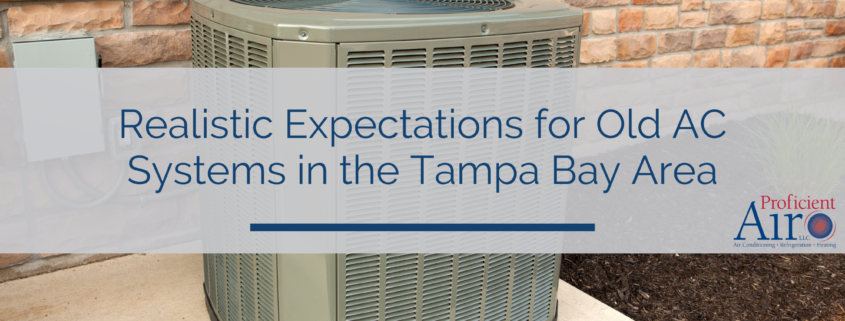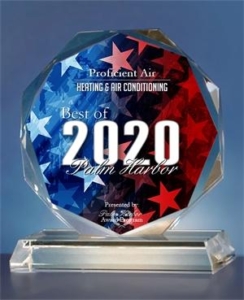Realistic Expectations for Old AC Systems in the Tampa Bay Area
As much as we would all love to have our central air conditioners last forever (that is unless you are in the HVAC business), it is simply an unrealistic expectation, even if you keep on track with routine air conditioner maintenance. The longevity of an HVAC system in the Tampa Bay area will be prolonged with regular maintenance, without a doubt, but air conditioning units will not sustain operation longer than two decades, especially in our hot, tropical climate!
The reason I bring this up is…
One of our professional air conditioning service technicians recently went out to give a quote for a new central air conditioning system to replace an AC unit in a residential space that was easily more than 20 years old.
The homeowner only feigned interest in a new system, though. She actually wanted her ancient AC unit repaired. We’ve been in this business for many years, and we take pride in the products and services we provide. That said, it was important that the homeowner understand the full scope of the issues her old air conditioner harbored and why replacement was the only way Proficient Air, or any other HVAC company, could help.
First of all, when one of our expert service technicians comes out to a residential property to provide a quote for a new system installation, they do an overall inspection of the current unit and assess the main components. The tech does not touch the unit or do any troubleshooting, but he simply observes the system placement and its size in order to provide an estimate of costs for a new air conditioning system.
Depending upon the configuration, these costs may include the use of a crane, if necessary; what is needed to bring the system up to current code, etc.
Secondly, if one of our air conditioner technicians responds to a request to diagnose an issue, we charge a diagnostic fee for the service and schedule a time for repairs.
Third, we pride ourselves on being an honest company that will provide all viable options including repairs if we believe that’s best. It is not our practice to only quote new system installations. If repairs are possible to correct issues, our highly trained team of AC service technicians will gladly perform the repairs after a solid diagnosis of the issues.
However, we do not recommend repairs on a 20-year unit for the same reason we do not recommend maintenance. Due to the lack of warranty and age, the unit can easily become a money pit with one repair after another once you start fixing it. Additionally, it’s not always easy to find parts for an older system.
Finally, the refrigerant used in central air conditioning units that are 20+ years old is obsolete and quite expensive per pound. The wise choice is to invest in a new, more energy-efficient air conditioner that will save you money in the long run and will function better for you, your family, your home, and your environment.
New HVAC System Installation
An air conditioning system is a major investment for homeowners, so finding the best, most experienced HVAC contractors in the Tampa Bay area to complete a proper design and system installation could mean the difference between a smooth, seamless install or a problematic one with delays and added expenses.
Proficient Air’s highly trained contractors and installers provide the level of expertise required to select the best AC system for your space and perform the quality installation required to achieve maximum energy efficiency and home comfort for you and your family.
Benefits of a New HVAC System Installation
Aside from energy efficiency and improved functionality, there are additional benefits of a new AC system installation:
- New air conditioners use a refrigerant that is much better for the environment.
- New air conditioners are designed to work smarter, not harder to achieve the level of home comfort you desire
- Installing a new energy-efficient HVAC system may qualify for a tax credit. (Visit irs.gov to find the current guidelines).
- We give our customers a one-year warranty that covers all parts, labor, and workmanship for the equipment we install.
Routine Maintenance is Key. Once you invest in a new AC system, routine maintenance is highly recommended to keep it operating at its optimum year after year. For new AC systems and air conditioners that are less than 5 years old, maintenance by a professional service technician should occur at least once per year, and twice per year for units 5+ years old. A Proficient Air AC service tech in the Tampa Bay area will carefully examine your system to ensure all components are operating properly and troubleshoot any areas of concern that might eventually cause the system to fail.
According to the US Department of Energy, “An air conditioner’s filters, coils, and fins require regular maintenance for the unit to function effectively and efficiently throughout its years of service. Neglecting necessary maintenance ensures a steady decline in air conditioning performance while energy use steadily increases.”
Expert air conditioner maintenance in the Tampa Bay area should always include a close inspection of the air filter; the drain pan; all coils and coil fins on indoor and outdoor components that are essential for efficient air conditioning functionality.
If you need a reliable, dependable experienced air conditioning company, Proficient Air is poised and ready to help choose the most energy-efficient and environmentally friendly unit for your residential space and offer a competitive quote for a new air conditioning system installation.
Proficient Air in Palm Harbor offers a variety of high-quality air conditioning systems, as well as routine maintenance contracts that are specifically tailored to meet your needs and budget, as well as financing options. Contact Proficient Air when it’s time for a new air conditioner system installation, air conditioning maintenance, air conditioner repairs, or air quality products in the Tampa Bay area. 727.386.2732
Source:







